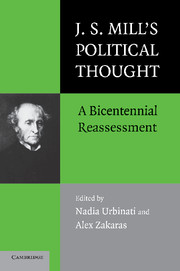Book contents
- Frontmatter
- Contents
- List of Contributors
- Introduction
- PART ONE LIBERTY AND ITS LIMITS
- 1 Mill on Liberty and on the Contagious Diseases Acts
- 2 Rational Freedom in John Stuart Mill's Feminism
- 3 The Many Heads of the Hydra: J. S. Mill on Despotism
- 4 J. S. Mill and Liberal Socialism
- 5 The Method of Reform: J. S. Mill's Encounter with Bentham and Coleridge
- PART TWO DEMOCRACY AND THE INDIVIDUAL
- PART THREE BEYOND NATIONAL BORDERS
- Bibliography
- Index
3 - The Many Heads of the Hydra: J. S. Mill on Despotism
Published online by Cambridge University Press: 08 January 2010
- Frontmatter
- Contents
- List of Contributors
- Introduction
- PART ONE LIBERTY AND ITS LIMITS
- 1 Mill on Liberty and on the Contagious Diseases Acts
- 2 Rational Freedom in John Stuart Mill's Feminism
- 3 The Many Heads of the Hydra: J. S. Mill on Despotism
- 4 J. S. Mill and Liberal Socialism
- 5 The Method of Reform: J. S. Mill's Encounter with Bentham and Coleridge
- PART TWO DEMOCRACY AND THE INDIVIDUAL
- PART THREE BEYOND NATIONAL BORDERS
- Bibliography
- Index
Summary
“But (however it be with pain in general) the abolition of the infliction of pain by the mere will of a human being, the abolition, in short, of despotism, seems to be, in a peculiar degree, the occupation of this age; and it would be difficult to show that any age had undertaken a worthier. Though we cannot extirpate all pain, we can, if we are sufficient determined upon it, abolish all tyranny: one of the greatest victories yet gained over that enemy is slave-emancipation, and all Europe is struggling, with various success, towards further conquest over it.”
J. S. Mill, “The Negro Question,” 1850, CW XXI: 95“The attempt to establish freedom by foreign bayonets is a solecism in terms. A government which requires the support of foreign armies cannot be a free government.”
J. S. Mill, “The Spanish Question” [July 1837] CW XXXI: 374.Liberty and despotism, an inverse pair, have configured Western civilization since its Mediterranean inception, troubling its major political thinkers from Herodotus and Aristotle to Montesquieu and Tocqueville. Although liberty has won many battles, despotism has never disappeared but has mutated to preserve itself. Such mutations demand analysis. Modern usage has emptied the term “despotism” of its classical meaning by making it synonym for tyranny, autocracy, dictatorship, authoritarianism, and absolutism. In recent decades, totalitarianism has almost replaced it completely. Finally, liberalism's global victory over totalitarianism has rendered the nonliberal regime a temporary condition along the fatal march towards democracy.
- Type
- Chapter
- Information
- J.S. Mill's Political ThoughtA Bicentennial Reassessment, pp. 66 - 97Publisher: Cambridge University PressPrint publication year: 2007
- 10
- Cited by

